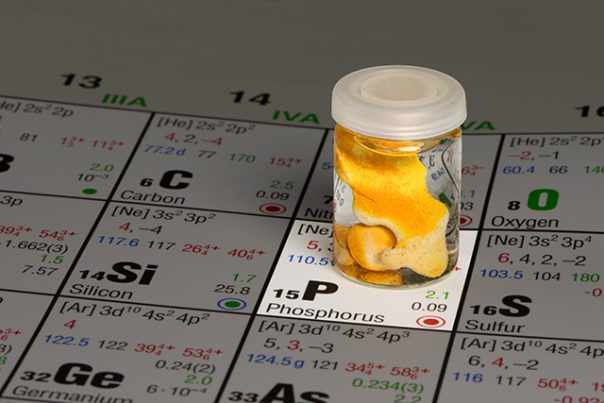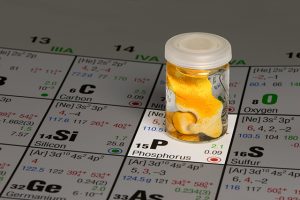
Phosphorus sources, health benefits and uses
Thursday, September 28, 2017 by Michelle Simmons
http://www.naturalpedia.com/phosphorus-sources-health-benefits-and-uses.html

Phosphorus is the second most abundant mineral in the body, while calcium is the first. Phosphorus plays an important role as a building block for bones and teeth. It is also a key nutrient in helping the body use and store energy. Moreover, it helps regulate kidney and nerve function, muscle contractions, and heartbeat. It is also a critical component for the normal function of every cell in the body.
Phosphorus and calcium together protect the bones from osteoporosis, prevent dental problems, and support normal cell function in the body.
Phosphorus is not hard to find. Main food sources of phosphorus are protein-rich foods which include meat, poultry, fish, eggs, and dairy foods such as milk, yogurt, and cheese. Other good sources include whole grains, beans, nuts, hard potatoes, dried fruit, garlic cloves, and carbonated beverages.
Medicinal uses for phosphorus
Phosphates (phosphorus) are used clinically to treat hypophosphatemia, a condition in which the body has low levels of phosphorus. They are also used to treat hypercalcemia, a condition in which there is high blood calcium levels in the body. Lastly, it is used to treat calcium-based kidney stones. These three conditions require doctor’s medication.
In addition, phosphates are also used in enemas as laxatives. Some athletes also use phosphate supplements before competition or heavy workouts to help reduce muscle pain and fatigue.
Body systems supported by phosphorus
Phosphorus has a number of functions for the body’s organs and systems. Phosphorus supports the skeletal system. Phosphorus promotes bone growth, as it is a vital part of the growth process and the maintenance of bones and teeth. It works with calcium to strengthen the bones, which can withstand the normal wear and tear of human life. It also helps in boosting the health of the gums and tooth enamel. This mineral can ease serious problems like bone loss or the loss of mineral density known as osteoporosis. It lays the foundation of a strong skeletal structure to ensure a healthy and functional living.
Phosphorus has the ability to reduce muscle weakness, numbness, fatigue, and similar ailments. Having normal levels of phosphorus in the body makes the body fit and active. Sexual weakness can also be cured with healthy supplementation of phosphorus into the body. Problems such as loss of libido, frigidity, impotence, and sperm motility can be boosted by having enough supply of phosphorus in the body.
This mineral also supports the digestive system. It plays an important role in boosting digestion by stimulating the digestion of riboflavin and niacin. Phosphorus clears up indigestion, constipation, diarrhea, and generally tones up the digestive system for regular, healthy bowel movements.
Moreover, it is known to stimulate protein metabolism, which keeps the body growing and maintaining itself. It is an important element in the creation of proteins, which further help in the process of reproduction. It facilitates the maximum utilization of proteins in the body to ensure the proper growth and repair of cells. It also helps the body utilize carbohydrates and fats. Phosphorus helps in the flow of energy and its usage by different organ systems.
It also facilitates nutrient uptake as it acts as a participant or co-factor in a number of chemical reactions taking place in the body. In addition, phosphorus boosts cell repair. It ensures that body cells are developed and remain active.
This mineral also regulates the balance of hormones by directly interacting with the endocrine glands of the body and helps to regulate the creation and release of hormones.
This mineral supports the brain. Enough levels of phosphorus in the body help the brain function normally. It also supports cognitive growth and development.
Phosphorus benefits the excretory system. It keeps the kidneys healthy by ensuring the proper release of waste from kidneys through the process of urination and excretion. By increasing the quantity and frequency of urination, the body is able to balance its levels of uric acid, excess salts, water, and even fat. It also encourages the healthy balance of all fluids and materials that are eliminated from the body, thus keeping the entire body clean, toxin-free, and healthy.
Where to learn more
- Monsanto war crimes exposed via white phosphorus, a chemical that burned civilians to the bone
- Conventional agriculture using up global supply of phosphorus, causing widespread pollution
- The health effects of drinking soda – quotes from the experts
- Scientists discover how to remove harmful phosphorus from wastewater
- Nutrients.news
Summary
Phosphorus, the second most abundant mineral, keeps the kidney, bones, and teeth healthy. It helps in the flow of energy, regulates hormones, and maintains and repairs body cells. It also supports the brain, digestive system, and muscular system.
Sources include:
Tagged Under: Tags: phosphorus






